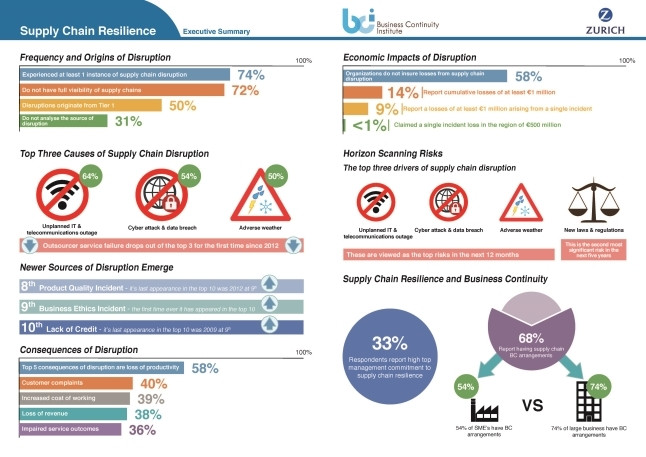Nearly one in 10 organisations are not aware of who their key suppliers are, leaving them open to severe disruption as they are unable to manage their supply chain effectively. That is according to a report published by the Business Continuity Institute and supported by Zurich Insurance Group.
The Supply Chain Resilience Report highlighted that seven in 10 organisations admit to not having visibility over their full supply chain, and as the survey also revealed that half of disruptions occur below the preliminary tier 1 supplier of goods, this makes it extremely difficult to establish where an organisation lies within its suppliers' priorities.
This could have major consequences when it comes to managing the supply chain and ensuring disruptions are minimised, which is particularly important given that the report also found 74% of organisations had suffered at least one disruption during the previous 12 months, and that 14% had suffered cumulative losses of at least EUR1 million as a result.
Other findings of the report include:
* Unplanned IT and telecommunications outage (64%), cyber attack and data breach (54%) and adverse weather (50%) are the top three causes of supply chain disruption. New entries to the top 10 are: product quality incident (8th), business ethics incident (9th) and lack of credit (10th).
* The top five consequences of disruption are loss of productivity (58%), customer complaints (40%), increased cost of working (39%), loss of revenue (38%) and impaired service outcomes (36%).
* One-third (33%) of respondents report high top management commitment to supply chain resilience, increasing from 29% last year.
* About seven out of 10 respondents (68%) report having business continuity arrangements in place to deal with supply chain disruptions.
Patrick Alcantara DBCI, Senior Research Associate at the BCI and author of the report, commented: "Recent incidents have shown us how supply chain disruptions can negatively impact an organisation's bottom line, reputation and resilience. This year's Supply Chain Resilience Report demonstrates how good practice can mitigate the worst effects of these disruptions. With findings consistently showing top management commitment as a key enabler of supply chain resilience, we encourage business leaders to take a closer look at their supply chains and champion good practice across their organisations."
Nick Wildgoose, Global Supply Chain Product Leader at Zurich Insurance Group, commented: "Through our work with customers in this area, we have found that increasing visibility along supply chains and resilience are major sources of competitive advantage. Top management leadership is the key to overcoming silo thinking about supply chains within an organisation."
Now into its seventh year, the annual Supply Chain Resilience Report represents a long-standing working partnership between the BCI, Zurich Insurance Group and CIPS (Chartered Institute of Purchasing and Supply). It is now an influential and go-to industry resource that tracks the origins, causes and consequences of supply chain disruption across industry sectors and regions worldwide, as well as the overall evolution of risk. For example, the report has highlighted the greater risk of multi-tier exposure as well as simple direct supply chain exposure.
Likewise, Zurich's involvement has helped reinforce the emergence of threats beyond just the physical to the less tangible risks, such as cyber risk. The report continues to benchmark business continuity arrangements in one place - including the uptake of insurance - in different organisations, and is one of the most comprehensive, practitioner-led studies in the field. The BCI, Zurich Insurance Group, and CIPS involvement in previous surveys has and will continue to provide organisations with the much-needed critical insights and valuable information to support the development of appropriate strategic responses and approaches to mitigate the impact and consequences of disruptions within their supply chains.

Share
Editorial contacts